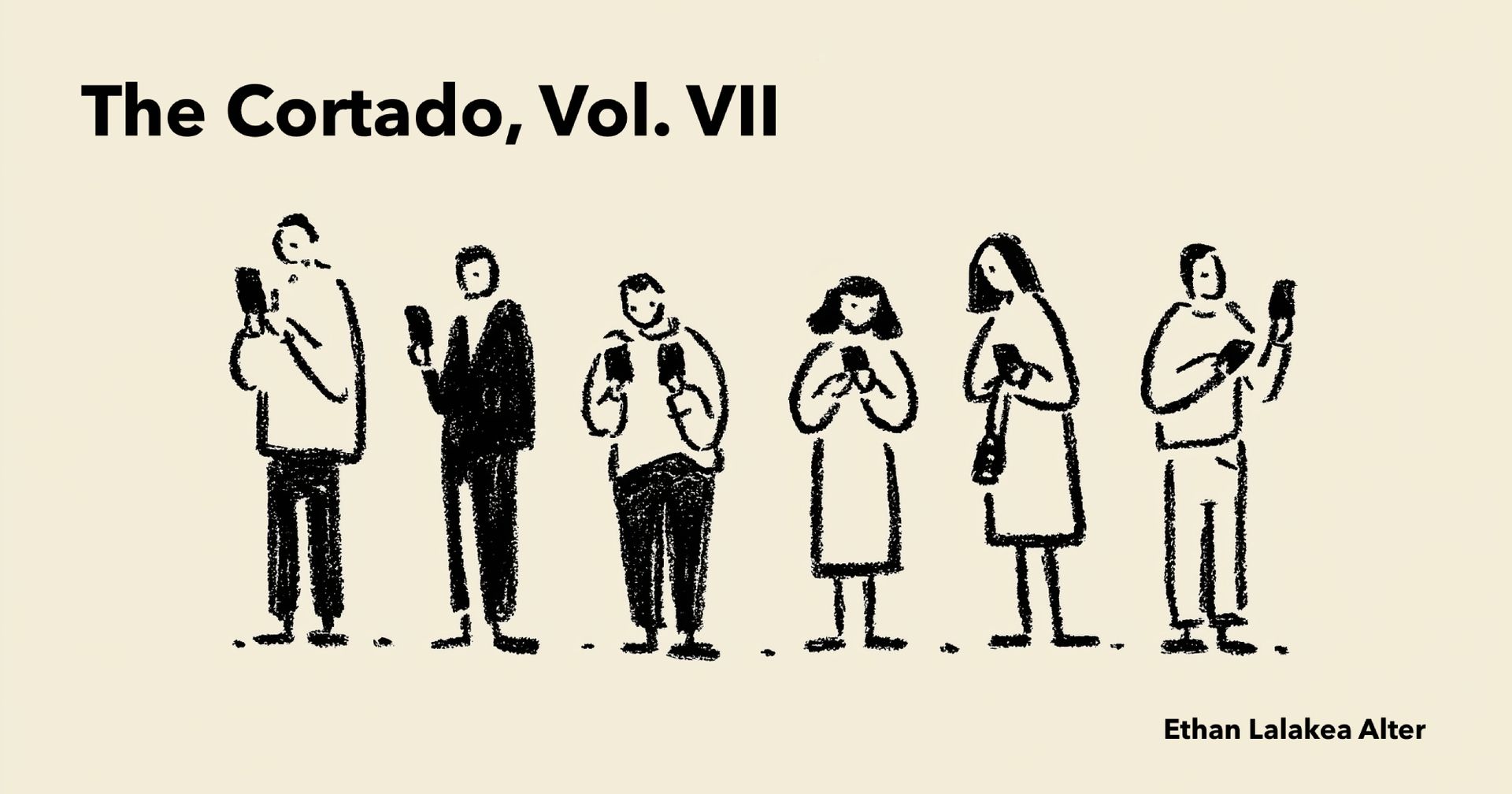- The Cortado
- Posts
- The Cortado, Vol. VII
The Cortado, Vol. VII
Will we remember?

Each month, as the aughts turn to ides, I am filled a dread particular and familiar. Oh dear God, it’s time to start writing The Cortado.
There is so much that I cannot remember, or at least, cannot summon, cannot pluck from the beach of my subconscious to turn it over in my hand-mind (mind-hand?) before either winging it back into the ocean or putting it in my pocket to bring home for further study.
For example, what did I write in last month’s edition of the Cortado? No idea. There is a huge amount of life that washes over me, un-honored with a memory.
If I don’t remember something, did it happen? Am I the tree falling in the forest? Science tells us that, yes, it happened; events you don’t remember still leave a mark. Your brain, like your body, adapts to what you repeatedly ask it to do, and your brain, like your body, keeps the score. Our attention spans are the way they are because we repeatedly ask our brains to switch contexts, and after awhile in one context, our brains start to get… antsy. They have adapted, and adaptation, like freedom, doesn’t come free.
Which brings me back to forgetting. There are individuals, who by dint of a gift / curse / brain injury, remember everything. It turns out there are advantages to forgetting: emotional regulation, social learning, and decision-making are some of the mental skills supported by forgetting. Forgetting may be, as my father would say, a feature, rather than a bug.
Say you’ll remember me… even if it’s just pretend.
Like some of you, I live in San Francisco. If one lives in San Francisco and sends a newsletter, one is required to devote some number of words to (what is called in the vernacular) “AI,” short for artificial intelligence. I don’t make these rules. Here are those words:
The word “agent” is romantic, isn’t it? It implies power: power held by a principal to whom the agents answers. For important transactions and matters of state, we employ agents. 007 is an agent of Britain, and his duty is to act as the state would act if it were so embodied. The Craig Bond is rugged to be sure (and ruggedly handsome), but he does exercise state power through the three “elementary principles of domination” that characterize modern states: violence, information, and charisma (Graeber & Wengrow, 2021, p. 390).
Agent is the not-that-new word in everyone’s AI mouths and minds. Here is the Salesforce homepage, for example.

(It will never not be funny to me that Salesforce will take any word and then add the word “force” to the end of it to make a new word. Elite naming convention. While employed there, I worked with the marketing budget, and I used a tool called… Budgetforce.)
The vision of a limitless workforce is inspiring and terrifying. Imagine, a “swarm” of AI agents doing your bidding.
But sometimes, I think I’d prefer that my agents tell me what to do.
One flavor is the agent using me as an API to the physical world. I’d give the agent some high-level directive, and they break-down the objectives into strategies, tactics, then tasks, some of which they handle and some of which they delegate back to me, because I have a body (featuring opposable thumbs!), and that has certain advantages. It stands to reason that, as long as I have a corporeal form and the agent does not, there are certain things that it should tell me to do.
But maybe I want to give even less input. Like for example, if I were a TikTok person, I'd want to wake up and have the agent tell me, based on the news and its knowledge of what I can plausibly talk about, what I should say that day for maximum engagement. Actually, that example is completely feasible today and almost certainly a real use case for some creators.
Or maybe even less. Like, “Hey, Ethan Agent” — I too can creatively name things — “what should I do now / today / with my life? Be specific, and respond as though you were 007 written by Monty Python.”
This question of how much to delegate has some of the same dimensions with AI as it does with humans: who knows better? Who can do better? Who has a higher (opportunity) cost? How much meaning is lost in the communication of what I want?
Do I know what I want? Do you? For those with access to power, will everything come down to this question?
Things of the Month
Book of the Month

A Tale of Two Cities by Charles Dickens
I had never read this book. The stories are rich and the characters full, but what I’ll remember of Dickens is his ability to write passages, sometimes full pages, that just stun, in the near literal sense of feeling temporarily unable to react.
A wonderful fact to reflect upon, that every human creature is constituted to be that profound secret and mystery to every other. A solemn consideration, when I enter a great city by night, that every one of those darkly clustered houses encloses its own secret; that every room in every one of them encloses its own secret; that every beating heart in the hundreds of thousands of breasts there, is, in some of its imaginings, a secret to the heart nearest it! Something of the awfulness, even of Death itself, is referable to this.
Imagining of the Month

brought to you by Midjourney, lightly edited
Song(s) of the Month
Can it just keep getting better?
Sneaking this one in on the 31st!
Until next month / yours,
Ethan
Works Cited
Graeber, D., & Wengrow, D. (2021). The dawn of everything: A new history of humanity. Farrar, Straus and Giroux.